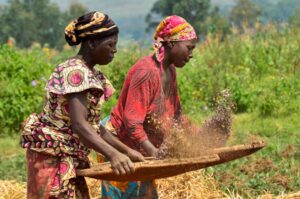By Happiness N.Onyebuchi
In Nigeria, Agriculture is deeply woven into the nation’s cultural fabric. It shapes traditions, sustains communities, and serves as a common ground for diverse ethnic groups. Yet, despite its unifying potential, the sector has increasingly become a flashpoint for division, as intra-ethnic tribalism fuels conflicts that threaten food security, economic stability and social cohesion.
Across the country, long-standing ethnic tensions have crept into the agricultural space, creating barriers to land access, trade, and cooperation. The friction between settled farmers and nomadic herders, most notably the clashes involving Fulani pastoralists, has escalated in recent years. These conflicts, often framed as ethnic or religious disputes, are worsened by rapid population growth, climate change, and ambiguous land tenure policies. As fertile lands become battlegrounds, farming communities face displacement, food production declines and inflation drives essential commodities beyond the reach of many Nigerians.
The impact of this division is undeniable. Agriculture contributes about 25% of Nigeria’s GDP, according to the Food and Agriculture Organization (FAO), yet its full potential remains stifled by discord. A 2022 World Bank report highlighted that inflation has pushed nearly eight million more Nigerians into poverty, raising the total number of impoverished citizens to around 90 million. These figures translate into real hardships, exposing the urgent need to address systemic fragmentation within the sector.
Historically, agriculture has not just been an economic activity but a cultural bridge. Farming traditions, communal harvests and food festivals have long facilitated inter-ethnic exchanges, fostering mutual respect and cooperation. Markets across the country tell stories of this interconnectedness. Yam farmers from Benue trade with rice growers in Kebbi, while fishermen from the Niger Delta supply inland communities. Such collaborations prove that agriculture can be a platform for unity rather than division.
Rebuilding cohesion in Nigeria’s agricultural landscape requires a deliberate, multifaceted approach. Clear land ownership policies must be put in place to prevent disputes and ensure fair access for all ethnic groups. Governments and local authorities should establish designated grazing routes and herding areas to minimize conflicts between farmers and pastoralists. Beyond policy, cultural festivals celebrating shared agricultural practices can serve as melting pots for dialogue and collaboration.
Inter-ethnic agricultural cooperatives could also encourage communities to work together towards common economic goals. By leveraging traditional practices that once fostered unity, Nigeria can create a farming ecosystem that thrives on diversity rather than division.
There is no quick solution to the deep-seated issues within Nigeria’s agricultural sector. However, history proves that societies flourish when they embrace diversity rather than allow it to be a source of conflict. The nation can cultivate a future where economic resilience and social harmony go hand in hand if and when they entwine cultural heritage into agricultural development. The land has always been a source of sustenance; therefore, it can also be the foundation for national unity.
